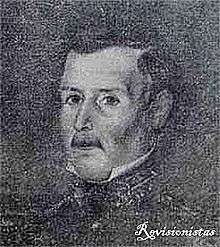Francisco Crespo y Denis
Francisco Crespo y Denis (1791–1849) was an Argentine patriot officer, who participated in the War of Independence, Brazilian War,[1] and in the Argentine Civil Wars.[2]
Francisco Crespo y Denis | |
|---|---|
 | |
| Born | 1791 Buenos Aires, Viceroyalty of the Río de la Plata |
| Died | 1849 (aged 57–58) San Isidro, Buenos Aires, Argentina |
| Allegiance | |
| Rank | Colonel |
| Unit | Army of the Andes |
| Battles/wars | Battle of Cotagaita Battle of Suipacha Battle of Huaqui Battle of Chacabuco Battle of Maipú Battle of Vuelta de Obligado |
Biography
Francisco Crespo was born in Buenos Aires, the son of Buenaventura Crespo, born in Galicia, and Cathalina Denis, a criolla descendant of Gerónimo Denis, a settler of Irish ancestors, established in the mid 17th century in the city of Córdoba.[3]
Crespo began his military career in 1808, and two years later it was incorporated into the Army of the North, in command of Antonio González de Balcarce, where he participated in the actions of Suipacha.[4] In 1812 had been part of the army during Siege of Montevideo (1812–14).[5] In 1814 Crespo enlists in the Army of the Andes, fighting in the battles of Chacabuco and Maipu.[6] In 1826 he participates in the war of Brazil and fighting heroically in the Battle of Ituzaingó.[7]
In 1830s Francisco Crespo was military commander in Carmen de Patagones, city where he was married to Angela Ocampo.[8] During the Battle of Vuelta de Obligado, Crespo replaces the General Lucio Norberto Mansilla, in the command of Argentine troops against the Anglo-French squad.[9]
References
- La guerra contra el imperio del Brasil: diario de noticias, 1825–1828. Francisco Lynch, Julio Arturo Benencia.
- Vida política de Juan Manuel de Rosas, a través de su correspondencia, Volume 5. Ediciones Trivium.
- Punilla, desde el Dique al Uritorco: noticias histórico-etnológicas sobre la región. Pablo Cabrera.
- Buenos Aires—historia de las calles y sus nombres, Volume 1, Vicente Osvaldo Cutolo
- Efemérides argentinas, 1492–1966, Volume 2. 1967.
- Primeros modernos: arte y sociedad en Buenos Aires a fines del siglo XIX, Laura Malosetti Costa
- Martín García: la gloriosa isla prisión. Antonio Emilio Castello.
- Crónica histórica del Río Negro de Patagones (1774–1834), José Juan Biedma
- Francisco Crespo, Revisionistas